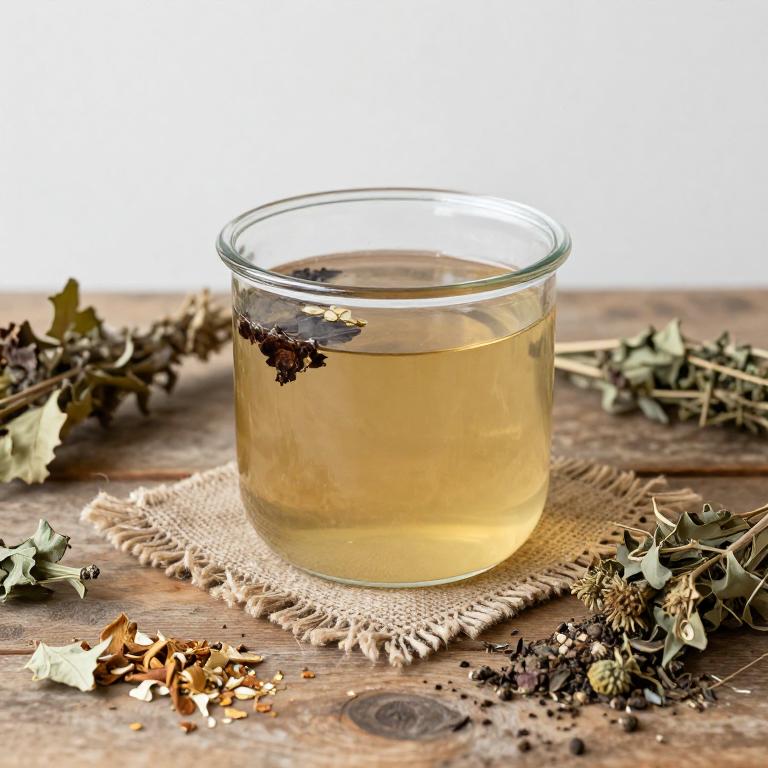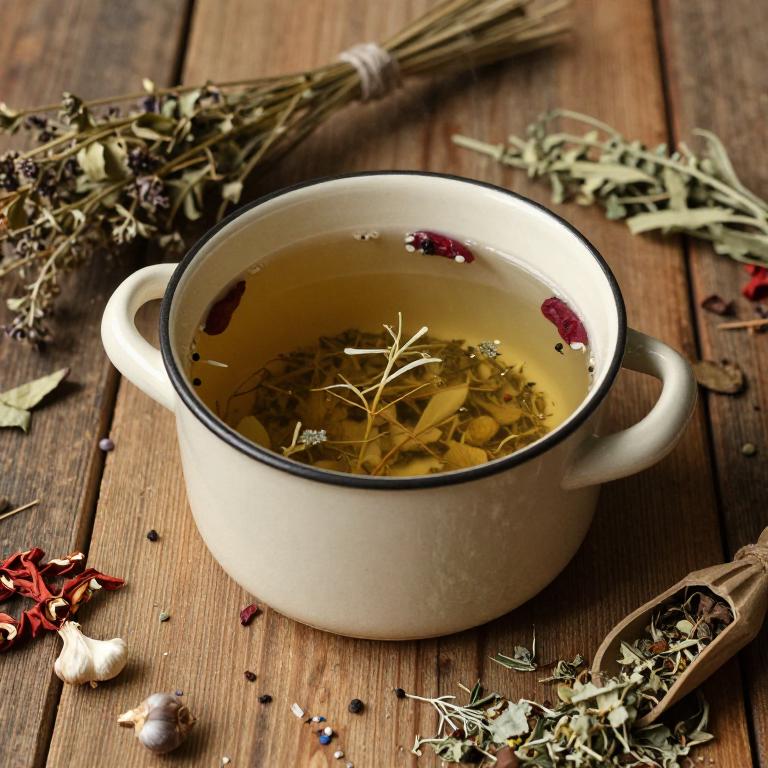10 Best Herbal Decoctions For Stomach Discomfort

Herbal decoctions have been traditionally used to alleviate stomach discomfort by leveraging the therapeutic properties of various plant-based ingredients.
Common herbs such as ginger, peppermint, chamomile, and licorice root are often included in these decoctions due to their anti-inflammatory, antispasmodic, and soothing effects on the digestive system. To prepare a decoction, the herbs are typically simmered in water for an extended period to extract their active compounds, resulting in a potent liquid remedy. These natural treatments are often preferred for their mild side effect profile compared to pharmaceutical alternatives.
However, individuals should consult with a healthcare professional before using herbal decoctions, especially if they have underlying health conditions or are taking other medications.
Table of Contents
- 1. Cumin (Cuminum cyminum)
- 2. Fennel (Foeniculum vulgare)
- 3. Licorice (Glycyrrhiza glabra)
- 4. Ginger (Zingiber officinale)
- 5. Turmeric (Curcuma longa)
- 6. Black pepper (Piper nigrum)
- 7. Thistle (Silybum marianum)
- 8. Chamomile (Matricaria chamomilla)
- 9. Ceylon cinnamon (Cinnamomum verum)
- 10. Peppermint (Mentha piperita)
1. Cumin (Cuminum cyminum)

Cuminum cyminum, commonly known as cumin, has been traditionally used in herbal medicine for its beneficial effects on digestive health.
Cumin herbal decoctions are prepared by simmering the seeds in water to extract their active compounds, which include essential oils, flavonoids, and other bioactive substances. These decoctions are often used to alleviate symptoms of stomach discomfort such as bloating, gas, and indigestion due to their carminative and antispasmodic properties. The aromatic compounds in cumin help stimulate digestion and reduce gastrointestinal distress, making it a popular remedy in various traditional healing systems.
Regular consumption of cumin decoctions may also support overall gut health and promote a feeling of satiety.
2. Fennel (Foeniculum vulgare)

Foeniculum vulgare, commonly known as fennel, has been traditionally used in herbal medicine to alleviate stomach discomfort due to its carminative and antispasmodic properties.
A fennel herbal decoction is typically prepared by simmering the seeds or dried leaves in water for several minutes, allowing the active compounds to infuse into the liquid. This decoction is often consumed warm to help soothe digestive tract spasms and reduce bloating, gas, and indigestion. The essential oils in fennel, such as anethol, are believed to relax the gastrointestinal muscles and promote digestion.
While generally safe, it is advisable to consult a healthcare professional before using fennel decoctions, especially for prolonged periods or in conjunction with other medications.
3. Licorice (Glycyrrhiza glabra)

Glycyrrhiza glabra, commonly known as licorice root, has been traditionally used in herbal medicine for its soothing effects on the digestive system.
Herbal decoctions made from glycyrrhiza glabra are often prepared by simmering the dried root in water to extract its active compounds, such as glycyrrhizin and flavonoids. These decoctions are believed to help alleviate stomach discomfort by reducing inflammation and protecting the gastric lining. The herb's antacid and demulcent properties may also help soothe indigestion, heartburn, and ulcers.
However, long-term use of licorice root decoctions should be monitored due to potential side effects such as hypertension and electrolyte imbalances.
4. Ginger (Zingiber officinale)

Zingiber officinale, commonly known as ginger, has been widely used for centuries in herbal medicine to alleviate stomach discomfort.
Its active compounds, such as gingerol and shogaol, possess anti-inflammatory and analgesic properties that help reduce nausea, vomiting, and digestive upset. A ginger herbal decoction is typically prepared by simmering fresh or dried ginger root in water, allowing the beneficial compounds to infuse into the liquid. This traditional remedy is often recommended for conditions like indigestion, motion sickness, and morning sickness due to its soothing effects on the gastrointestinal tract.
Studies suggest that ginger decoctions can provide natural relief for mild stomach ailments, though it is advisable to consult a healthcare professional for persistent or severe symptoms.
5. Turmeric (Curcuma longa)

Curcuma longa, commonly known as turmeric, has been traditionally used for its medicinal properties, including its ability to alleviate stomach discomfort.
Herbal decoctions made from curcuma longa involve boiling the rhizome in water to extract its active compounds, such as curcumin, which possess anti-inflammatory and antioxidant effects. These decoctions are often used to relieve symptoms like indigestion, bloating, and gastritis due to their soothing and protective actions on the gastrointestinal tract. The warm, aromatic nature of the decoction can also provide a calming effect, helping to ease digestive distress.
However, it is important to consult with a healthcare professional before using turmeric decoctions, especially for individuals with existing medical conditions or those taking medications.
6. Black pepper (Piper nigrum)

Piper nigrum, commonly known as black pepper, has been traditionally used in herbal medicine for its potential to alleviate stomach discomfort.
The active compound, piperine, is believed to enhance digestive enzymes and stimulate the production of gastric juices, aiding in the digestion of food and reducing bloating. Herbal decoctions made from black pepper can be prepared by simmering the dried berries in water, creating a soothing and aromatic tea. This remedy is often used to relieve mild stomach cramps, indigestion, and nausea, though it should be used with caution in individuals with ulcers or gastritis.
While it may offer some relief, it is advisable to consult a healthcare professional before using black pepper as a treatment for persistent gastrointestinal issues.
7. Thistle (Silybum marianum)

Silybum marianum, commonly known as milk thistle, is a herbal remedy that has been traditionally used to support liver health and may also help alleviate stomach discomfort.
Its active compound, silymarin, possesses antioxidant and anti-inflammatory properties that can soothe gastrointestinal irritation and promote healing. Herbal decoctions made from silybum marianum are often prepared by simmering the dried seeds in water, creating a tea that can be consumed several times a day. These decoctions are believed to protect the stomach lining and reduce symptoms such as indigestion and bloating.
However, while generally considered safe, it is advisable to consult a healthcare professional before using milk thistle, especially for those with existing medical conditions or taking other medications.
8. Chamomile (Matricaria chamomilla)

Matricaria chamomilla, commonly known as chamomile, is a popular herbal remedy used to alleviate stomach discomfort due to its soothing and anti-inflammatory properties.
Chamomile herbal decoctions are prepared by steeping the dried flowers in hot water, creating a calming tea that can be consumed several times a day. This remedy is often recommended for conditions such as indigestion, bloating, and mild gastrointestinal spasms. The active compounds in chamomile, including bisabolol and apigenin, contribute to its ability to reduce stomach irritation and promote digestion.
While generally safe, it is important to consult a healthcare provider before using chamomile, especially for individuals with allergies or those taking medications.
9. Ceylon cinnamon (Cinnamomum verum)

Cinnamomum verum, commonly known as true cinnamon, has been traditionally used in herbal medicine for its potential to alleviate stomach discomfort.
The preparation of a herbal decoction involves simmering the bark in water for an extended period to extract its essential oils and active compounds. This decoction is believed to help soothe digestive issues such as bloating, indigestion, and mild nausea due to its anti-inflammatory and carminative properties. However, it is important to use it in moderation, as excessive consumption may lead to irritation of the gastrointestinal tract.
As with any herbal remedy, it is advisable to consult a healthcare professional before incorporating Cinnamomum verum into a treatment regimen for stomach problems.
10. Peppermint (Mentha piperita)

Mentha piperita, commonly known as peppermint, has been widely used in herbal medicine for its soothing effects on the digestive system.
Peppermint herbal decoctions are often prepared by steeping the dried leaves in hot water, creating a calming tea that can help alleviate symptoms of stomach discomfort. The active compounds in peppermint, such as menthol and rosmarinic acid, have antispasmodic and anti-inflammatory properties that can ease bloating, gas, and cramping. These decoctions are particularly beneficial for individuals suffering from irritable bowel syndrome (IBS) or indigestion.
However, it is important to consult a healthcare professional before using peppermint decoctions, especially for prolonged periods or in combination with other medications.